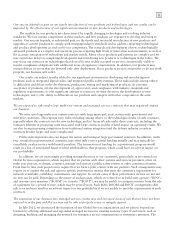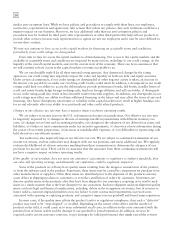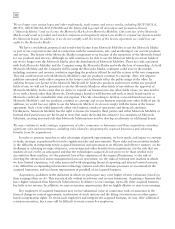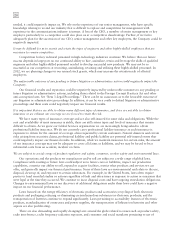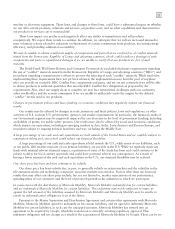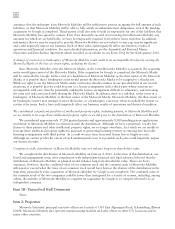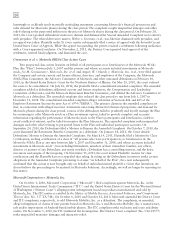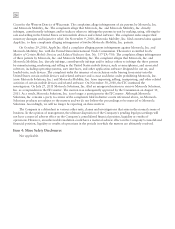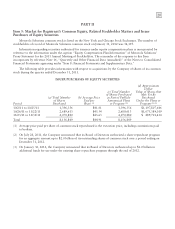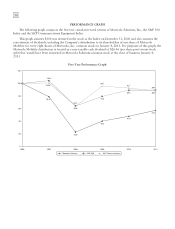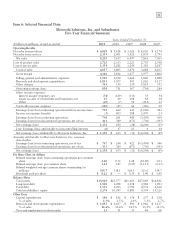Motorola 2011 Annual Report Download - page 27
Download and view the complete annual report
Please find page 27 of the 2011 Motorola annual report below. You can navigate through the pages in the report by either clicking on the pages listed below, or by using the keyword search tool below to find specific information within the annual report.
21
wireless or electronic equipment. These laws, and changes to these laws, could have a substantial impact on whether
we can offer certain products, solutions and services, on product costs, and on what capabilities and characteristics
our products or services can or must include.
These laws impact our products and negatively affect our ability to manufacture and sell products
competitively. We expect these trends to continue. In addition, we anticipate that we will see increased demand to
meet voluntary criteria related to reduction or elimination of certain constituents from products, increasing energy
efficiency, and providing additional accessibility.
We may be unable to obtain a sufficient supply of components and parts that are verified free of conflict minerals
mined from the Democratic Republic of Congo and adjoining countries, which could result in a shortage of such
components and parts or reputational damages if we are unable to certify that our products are free of such
minerals.
The Dodd-Frank Wall Street Reform and Consumer Protection Act included disclosure requirements regarding
the use of “conflict” minerals mined from the Democratic Republic of Congo and adjoining countries (“DRC”) and
procedures regarding a manufacturer’s efforts to prevent the sourcing of such “conflict” minerals. While final rules
implementing these requirements have not yet been released, the implementation may limit the pool of suppliers
who can provide us verifiable DRC Conflict Free components and parts, and we are not certain that we will be able
to obtain products in sufficient quantities that meet the DRC Conflict Free designation as proposed by the
requirements. Also, since our supply chain is complex, we may face reputational challenges with our customers,
other stockholders and the activist community if we are unable to sufficiently verify the origins for the defined
“conflict” metals used in our products.
Changes in government policies and laws, funding or economic conditions may negatively impact our financial
results.
Our results may be affected by changes in trade, monetary and fiscal policies, laws and regulations, or other
activities of U.S. and non-U.S. governments, agencies and similar organizations. In particular, the financial results of
our Government segment may be negatively impacted by any decreases in the level of government funding, including
availability of grants, for public safety projects. Our results may also be affected by social and economic conditions,
which impact our operations, including in emerging markets in Asia, India, Latin America and Eastern Europe, and
in markets subject to ongoing political hostilities and war, including the Middle East.
A large percentage of our cash and cash equivalents are held outside of the United States and we could be subject to
repatriation delays and costs which could reduce our financial flexibility.
A large percentage of our cash and cash equivalents is held outside the U.S., while many of our liabilities, such
as our public debt and the majority of our pension liabilities, are payable in the U.S. While we regularly repatriate
funds with minimal adverse financial impact, repatriation of some of the funds has been and could continue to be
subject to delay for local country approvals and could have potential adverse tax consequences. As a result of
having a lower amount of the cash and cash equivalents in the U.S., our financial flexibility may be reduced.
Our share price has been and may continue to be volatile.
Our share price has been volatile due, in part, to generally volatile securities markets and the volatility in the
telecommunications and technology companies’ securities markets in particular. Factors other than our financial
results that may affect our share price include, but are not limited to, market expectations of our performance,
spending plans of our customers and the level of perceived growth in the industries in which we participate.
In connection with the distribution of Motorola Mobility, Motorola Mobility indemnified us for certain liabilities
and we indemnified Motorola Mobility for certain liabilities. This indemnity may not be sufficient to insure us
against the full amount of the liabilities assumed by Motorola Mobility and Motorola Mobility may be unable to
satisfy its indemnification obligations to us in the future.
Pursuant to the Master Separation and Distribution Agreement and certain other agreements with Motorola
Mobility, Motorola Mobility agreed to indemnify us for certain liabilities, and we agreed to indemnify Motorola
Mobility for certain liabilities, in each case for uncapped amounts. Motorola Mobility has entered into an
agreement to be acquired by Google, which the transaction is currently awaiting regulatory approval. This
indemnity obligation will not change as a result of the acquisition of Motorola Mobility by Google. There can be no


